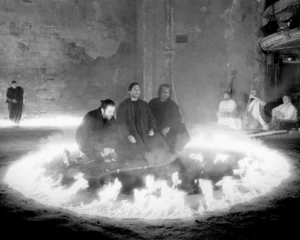How David Bowie Used William S. Burroughs’ Cut-Up Method to Write His Unforgettable Lyrics:
Bowie says, “if you put three or four dissociated ideas together and create awkward relationships with them, the unconscious intelligence that comes from those pairings is really quite startling sometimes, quite provocative.”
All models are wrong and some are useful, but most models are flammable.
I know this because I was courted with fire. I didn’t want presents: I wanted aftermaths and eucatastrophes and consequences. The white cold fever dream followed by the blunt force object; the collapsible distance between the esoteric and the erotic.
It’s Time to Start Studying the Downside of Psychedelics:
I’ve equated it to, like, someone did open heart surgery, you know…And they tore open my chest and they repaired the little damage in the heart there, but then everyone just walked away from the table and my chest was still wide open. No one’s going to survive that.
I think that there is something uncanny to endless rows of cubicles, to blank faces of glass towers, to the emergence of forms called ‘screens’ (so unlike it’s probable antecedent, the veil), that builds anti-worlds which resound back to our subjectivities as detachment.
Seed Phrases Enabling Liberation & Longevity:
Secret societies, religious brotherhoods, witches’ covens, they all have certain languages and codes used to be able to speak privately to one another and this collectively empowers them against forces of control. In the context of a tool like Bitcoin, a seed phrase grants access to a wallet containing financial freedom and individual sovereignty, and passing down that seed phrase to heirs in your family or tribe will become crucial as time passes. The seed phrase itself, and potentially its signifier-mnemonics, will be what is transmitted.
Flagellation, or mortification, is a spiritual practice that originated in (and was later suppressed by) the Roman Catholic Church around the 13th Century. It started in medieval Italy and Spain, but had spread across Europe. Even Martin Luther kept a whip for self-flagellation. For these practitioners, mortifying the flesh was a way to connect to God by emulating the suffering endured by Christ on Good Friday. The suffering is also offered up to God as part of a repentance scheme and framed as an act of extreme piety. As quickly as the movement spread it died down again thanks to the Pope denouncing it as a heresy. Practitioners seemingly disappeared, but there were secret underground orders such as Los Hermanos de la Fraternidad Piadosa de Nuestro Padre Jesus Nazareno. Popularly known by a simpler name, the Penitentes, this sect of flagellants made their way outside of Spain to colonial America and landed in northern New Mexico and parts of Southern Colorado, where they still reside as a semi-secret society.
Ignore the Thoughts, Feel the Sensations:
Psychologists and people who have suffered from depression are aware of rumination, of repeatedly thinking the same thoughts in an attempt to resolve an intractable problem and cure oneself by “figuring it out.”
This occurs on a small scale with many distressing emotional experiences; we become entangled in the thoughts arising from an emotion in the attempt to resolve it.
Though it may feel at the time like we are “working on the problem,” rumination rarely actually helps.
Kunstlosigkeit, or Fully Algorithmic Luxury Communism:
…great art can be produced by any means, because it is necessary. It is, in that sense, the most accessible Machiavellism, which raises the point of artistic intent. On this particular count, I think of it as I do about sexual consent: if purpose must always be made explicit, it inhibits the means of seduction, which debilitates transgression (hard limits force hard trespasses; nebulous boundaries can be trickier, as they are coded in a way that is not shared: the transgression loses force in reaching the escape velocity that makes it legible as such).
In antiquity, those who engaged in resource warfare had something to gain. There was always a chance for loot or social ascension, so the moral calculation was deeply personal: you went raiding, robbed cattle and wives, got rich and famous; with the ticket also came the risk of having to pay in blood. This was the ethos of the Vikings, now so much en vogue: an attitude that did not distinguish war from criminality, not at all different from the lifestyle glorified in gangsta rap. It had little to do with punctuality, courtesy, tidiness, or resisting self-indulgence. It was, however, sincere: a wretched, but not perverse, existence.
Each of us constitutes a link between the past and the future, and we share a human need to participate in the life of something that perdures beyond our own years. This is the conservationist — and arguably the conservative — argument for combating climate change: Our descendants, who will have a great deal in common with us, ought to be able to enjoy conditions similar to those that permitted us and our forebears to thrive.
Then things got weird. Then he started breaking down etheric bodies and astral realms and… entities. Spirits, essentially, that are everywhere. They sift inside of me, you, everyone to live within our physical bodies. It’s on us to recognize them, Watkins explained, and do everything in our power to work with the positive spirits.
wildflower panopticon pic.twitter.com/5GgkWBghFr
— тцпдяапацт (@tundranaut) June 23, 2022

